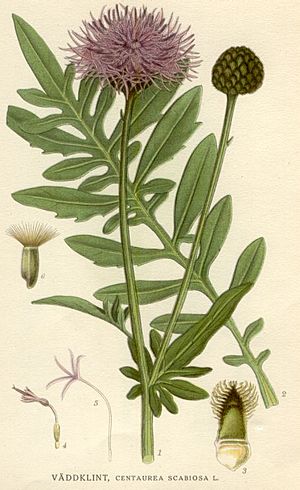Greater knapweed facts for kids
Quick facts for kids Greater knapweed |
|
|---|---|
 |
|
| Scientific classification | |
| Genus: |
Centaurea
|
| Species: |
scabiosa
|
Centaurea scabiosa, or greater knapweed, is a perennial plant of the genus Centaurea. It is native to Europe and bears purple flower heads.
Greater knapweed is found growing in dry grasslands, hedgerows and cliffs on lime-rich soil. Upright branched stems terminate in single thistle-like flowerheads, each having an outer ring of extended, purple-pink "ragged" bracts which form a crown around the central flowers. The plant has deeply dissected leaves which form a clump at the base.
This species is very valuable to bees. It is also a magnet for many species of butterfly. Among them is the marbled white.
This is the only known food plant for caterpillars of the Coleophoridae case-bearer moth Coleophora didymella. Centaurea scabiosa has been used in traditional herbal healing as either a vulnerary or an emollient.
The plant is sometimes confused with devils-bit scabious, however the leaves on this plant are arranged alternately, whereas in devils-bit they are opposite.
Contents
Description
This perennial herb grows with an erect grooved stem up to 90 cm high. The leaves are alternate, pinnatifid and with stalks. The flower heads are 5 cm across and on long stalks. The florets are red-purple.
Habitat
Dry grassland, roadsides and calcareous substrate.
Distribution
Found in Great Britain and Ireland.
See also
 In Spanish: Centaurea mayor para niños
In Spanish: Centaurea mayor para niños

